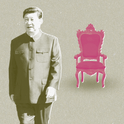The dustbin of history?
Dear Sir David,
We briefly overlapped, I recall, as schoolboys at Winchester, but I remember you better from the time in the early 1990s when I was reporting from the UN in New York and you were the British ambassador there. You were much admired by the journalists for your capacity to skip out of security council meetings with extraordinary rapidity to the corridor outside-where the television cameras would be waiting. Invariably you would get your version of events across before that of Madeleine Albright, the American ambassador-never your favourite, I believe. I thought then that you were a wonderful operator and often wondered whether you had not missed your vocation-you could have been an actor or even a politician. But I guess a good diplomat must also have a sense of theatre.
I had gone to New York for the Guardian to see whether the UN had a future in the post-cold war era. There was a good deal of talk after 1989 about a possible new world order, and some people thought that the UN might be revived as a valuable tool for the conduct of international relations. The Guardian, with its traditional sympathy for the peaceful resolution of conflict, was interested to know whether the time had come to upgrade its coverage of the institution.
I confess that even before I arrived in New York I was but a lukewarm supporter of the UN. I did not take the rightwing line that it was a positive menace. I saw it more as an irrelevance. I suspect that you too, after half a lifetime dealing with the evolving dynamics of Europe, must have wondered whether you had been put out to grass when sent to New York.
It is difficult now to remember that once there was tremendous political support in Britain for the UN. When I was at Oxford in the late 1950s, the UN Association was the largest political club in the university (level pegging with CND). The Congo crisis, handled by the UN for several years, attracted even more attention than the affairs of Yugoslavia have done in recent years. Working at Chatham House in the early 1960s, I recall there being at least two researchers working on UN affairs, as well as a full-time librarian dealing with the UN's formidable printed output.
Yet by the time of the Reagan-Thatcher years, that liberal internationalist enthusiasm had almost died away. People continued to pay lip service to the UN, just as hundreds of MPs still profess an interest in Esperanto, but few people really believed in it. Arriving in New York in 1990, I found a moribund organisation, with people just going through the motions. Of course there were young diplomats, particularly in the embassies of Germany and Japan, who could see fresh possibilities for their countries. There were clever Swedes and enthusiastic Canadians, and some sophisticated Peruvians and Brazilians. But broadly I found much of the rightwing caricature to be essentially correct: here was a gravy train of special interest groups cloaking their well-salaried, irrelevant activities with a large blancmange of self-righteousness-to mix an unappetising metaphor.
But I do not particularly want to follow that line of argument. Nor do I want to get diverted into a discussion about the possible merits of institutions such as the World Bank. Clearly some good may emerge from the interstices of what they do. What really interests me is the loss of faith in the political role of the UN. There has been a collapse not just in the credibility of the present UN system-brought on partly by a string of disasters in the 1990s-but of the whole liberal internationalist idea that has been inherited from the 19th century.
The UN grew out of the League of Nations which was a club of colonial powers. These powers, shocked by the experience of the first world war, had been led to believe that intercolonial rivalry might bear some responsibility. A club to settle their differences peacefully would be useful. Partly because the empires had been weakened by that war, and partly because of the mandate system, the League (and later the UN) acquired prestige in the colonies of the European empires that became the third world. In the 1960s and 1970s, when the UN security council was deadlocked by the veto powers of the two superstates, the debates of the general assembly gave the UN a populist legitimacy. The countries of the general assembly were not exactly the "peoples of the world" as envisaged in the UN charter, but they were a closer approximation to that nebulous concept than the security council.
Yet today, an organisation that allowed itself to be run by the general assembly would very soon collapse. One that continues to be run by the big five of yesteryear is living on borrowed time. Yet if Britain were to abandon its permanent seat on the security council and its veto-which I think it should-few people in the country would be willing to obey the UN's directives. Personally I would like us to leave the UN altogether, but I recognise that that is politically unlikely. I do however argue that the organisation itself is withering on the vine; in those circumstances I do not believe we should bother to try to keep it going.
Yours ever,
Richard Gott
5th November 1996
Dear Richard,
I do indeed remember our time together at the UN in New York in the early 1990s. You were always a bit sceptical about the idea of a UN renaissance but I did not realise at the time that your scepticism was close to outright hostility.
Those were hectic times at the UN as problem after problem thudded down on the security council table, in the unrealistic expectation that an organisation which a few years before had been considered capable of solving nothing could now suddenly in the aftermath of the cold war solve everything.
As you say, there was much talk of a new world order. I never liked that phrase. It contained a whiff of the Third Reich; and it was based on the improbable assump-tion that the world can be ordered. I do not see why the UN should now be crucified for failing to deliver on a phrase invented by one of George Bush's speech writers on an off day.
I find your description of the genesis of the UN wide of the mark. Of course the drive to bring colonies to independence was always part of its task. But it was far from being the only or principal one. Nor was it intercolonial rivalry alone that caused two world wars. After all, Hitler was quite ready to leave the British empire intact if only we would stop interfering with his European ambitions. But what motivated Churchill and Roosevelt when they first proposed a United Nations to succeed the League of Nations was the need to found some international machinery capable of ridding the world of the scourge of war. That remains the challenge today. It is not a time-limited task, nor one which is ever likely to be fulfilled with complete success.
I am glad that you do not wish to pursue what you describe as the rightwing caricature of UN incompetence, duplication and corruption. I could fill several pages with comparisons such as the fact that New York City pays more to keep the peace (or try to) than the UN spends worldwide on peacekeeping. But such comparisons serve to amuse rather than convince. It is not in any case my view that the UN is without blemish. It does need reform and gradually it is getting it, but much remains to be done.
The crucial point is: does the UN have real tasks to do and can we equip it to do them? Here I really do differ from you. In a period marked by developments which are summed up under the buzz word "globalisation," we surely need to seek global solutions to problems. That means strengthening global institutions such as the UN. The damage being done to the environment, the threat of a population explosion, the abuses of human rights in so many quarters of the world, are simply not going to be handled half successfully if we cannot summon up an effective global response to them.
And then there is peace and security, the primary task of the UN security council. Here, too, the turbulence of the post-cold war world poses real dangers to us all, although they seem further away than when two superpowers, armed to the teeth, confronted each other in the centre of Europe. But the risk from the proliferation of weapons of mass destruction is real. If we do not sustain the rule of international law we shall all too soon find ourselves with the law of the jungle.
You are right about the loss of public support for the UN. Somewhere in that alphabet soup of acronyms, the idealism of the early years has got lost. There is a need for political leaders to explain in simple and compelling language why the main problems we face require international responses. This is not a titanic struggle between world, or regional, federalism and the nation state, it is the application of simple common sense to a world, many of whose problems can simply no longer be handled by each nation looking after its interests in isolation.
So no, I do not want to see Britain giving up its seat on the security council or leaving the UN. The hard fact is that international organisations depend to a crucial extent on their middle-ranking members. Superpowers nurse the illusion that they can handle things on their own. Smaller states are enthusiastic multilateralists but bring few assets and resources to the table. Britain is one of those middle-ranking countries, without whose support the UN will not prosper. I would like to see us leading the search for reforms at the UN, not withdrawing into a sulky silence while others deal with problems that vitally concern us.
Yours,
David
7th November 1996
Dear David,
That was a splendid riposte to my assault which, as I think you understand, comes from an unexpected direction. The left, drawing on the threads of their anti-colonialist tradition, has usually been a supporter of the UN. Today, the wind is changing. John Major could happily make a speech along the lines of your letter; Tony Blair has been virtually silent on the matter. Why? Because (and here, as you rightly note, we are in agreement) there are no votes in it. There is no longer much public support for the UN. While you suggest that it should be championed and reformed, I argue that the public perception is correct: the UN is an archaic and largely irrelevant institution that has had its day.
What does your enthusiasm boil down to? That the UN should be supported because it is capable of "ridding the world of the scourge of war." Is there not some expression to the effect that fine words butter no parsnips? Granted, there has been no third world war, but the years since 1945 have been unusually combative. In some of the conflicts the UN itself has been a participant.
You argue that the problems caused by "globalisation" need global solutions provided by a global institution. But the UN is not a global institution. It is a great power institution masquerading as a global one. It is run by the big five, countries with a veto in the security council which are characterised by their possession of nuclear weapons. I agree with you that Britain is now "a middle-ranking country," but surely that perception should lead us to team up with those other middle-rankers who do not have the veto. One of the tragedies of the post-1945 era is that Britain has taken so long to settle down to an international role in keeping with its post-imperial profile.
Finally you are concerned about nuclear proliferation. As a lifelong supporter of CND, I am naturally hostile to those who brandish nuclear weapons. But I believe that stopping the spread of these weapons, like charity, should begin at home. The notion of the nuclear powers in the security council trying to prevent proliferation is, alas, risible.
Yours,
Richard
10th November 1996
Dear Richard,
Unfortunately for you, I note that Tony Blair has now broken his silence on the UN; and the Labour party's recent foreign policy document gives firm support to our permanent membership of the security council. Yet you are right that the UN is no longer a cry of the left; support for it now runs across the political spectrum. But that is a sign of strength, not weakness. Of course that means there are not many votes in it. But are you saying that British foreign policies should be determined solely on their vote-catching potential? I thought that was what journalists criticised politicians for doing, not what they advocated.
You say that the UN is archaic and irrelevant. But in the last decade alone it has run successful peacekeeping operations in Namibia, Cambodia, Mozambique and El Salvador. It has reversed a major act of aggression by Iraq. And it has brought action to protect the environment to the top of the world's agenda. None of this seems to me irrelevant; if the UN's methods are sometimes a bit archaic, then the remedy must be to update them.
You mock the efforts to prevent nuclear proliferation. But 30 years ago the press was full of confident predictions that by now there could be anything up to 20 countries with nuclear weapons. There are not, largely thanks to the efforts made to implement the non-proliferation treaty. Are you suggesting that the UN's action to prevent Saddam Hussein acquiring nuclear, chemical and biological weapons, is invalidated because there are five accepted nuclear weapons states?
I do not understand how you can say that the UN is not a global institution. It addresses a whole range of global issues, from population growth to the role of women, and reaches most of its decisions by consensus. How are you suggesting that problems of a global nature should be addressed, if not by the UN?
Yours,
David
11th November 1996
Dear David,
Of course I am not going to convince a former distinguished British ambassador that his life's work has been useless. I just want to point out that the world's perception of the UN has changed significantly over the years-and become (justifiably) more sceptical. That must raise a question mark about its future.
Would I mind if the UN disappeared tomorrow? No I would not, and if or when it happens I do not believe many people will bother to try to revive it. The old spirit of liberal internationalism-which infused the support that the UN once received-has evaporated into thin air. It cannot be conjured up afresh.
What I dislike about the UN is the hypocrisy. "We the people..." says the UN charter, echoing the American constitution. That is nonsense. The UN is run by barely half a dozen states, mostly in thrall to Washington, and one of the most influential and manipulative of these is Britain. If Britain were to withdraw, or even to lose its veto, the UN would exist only as a shadow. That is why discussion in Britain about the UN's future is important to the future health of the organisation.
You ask how we should cope with problems of a global nature. Well, at present, they are dealt with by the G7 wolf dressed up in UN sheep's clothing. One hundred years ago, the colonial powers of Europe ran the world, controlling the prices of commodities and sending armies to discipline recalcitrant peoples, and then often quarrelling among themselves about how it should be done. Today that small club exists in the shape of the G7 economically powerful countries. Through the agency of the UN, the G7 seeks to persuade people of the wisdom of its judgements and to cloak the reality of its largely unbridled power.
Yours,
Richard
12th November 1996
Dear Richard,
I think it is a bit of a low blow to insinuate that, because I worked at the UN for five years, my sup-port for the organisation is invalidated. But, seriously, I do think that you ought at least to have a shot at explaining how its tasks are to be otherwise performed. The first half of this century was a period of unparalleled bloodletting, economic collapse, and global international mayhem, which the UN, among other organisations, was set up to remedy. Are you seriously suggesting we should return to that? Or do you think that human nature has in the meantime become kindlier and gentler?
I hardly dare to quote from the G7 Lyons summit communiqu?"We continue to regard the UN as the cornerstone of an international system whose success or failure is increasingly significant for human society." Do they love this organisation for its archaic irrelevance or because it is an effective vehicle for their hegemony? Surely it cannot be both at the same time as you seem to be saying.
The practice of international diplomacy lends itself to charges of hypocrisy and to the disillusionment of those who want to see the world put to rights without more ado. But I am sad that you dismiss the efforts of those who work hard, in this country and elsewhere, for the UN as just so much self-serving manipulation. Is work for an organisation whose aims include human rights, democracy, peace, and sustainable development not worth a bit more credit from even the most hardened former liberal internationalist?
Yours,
David












